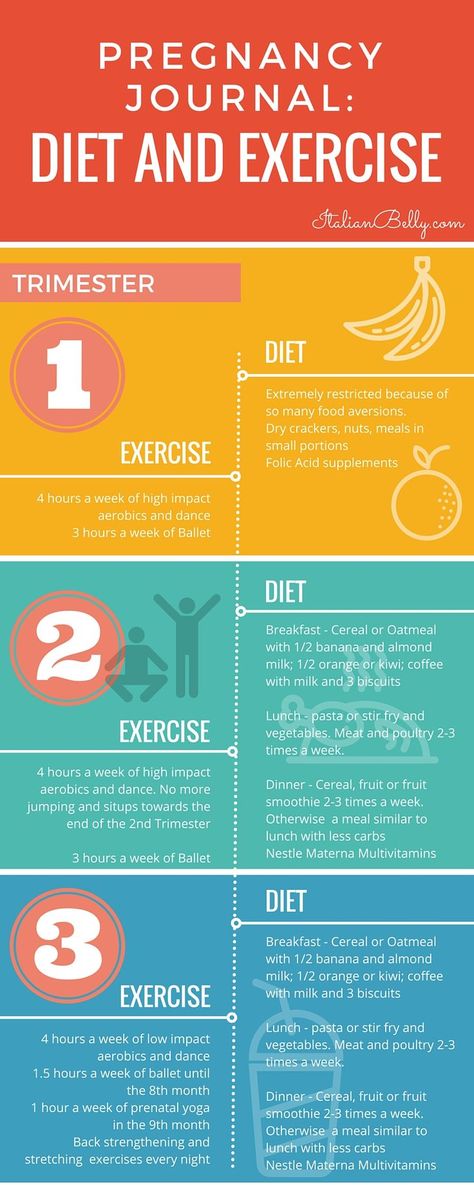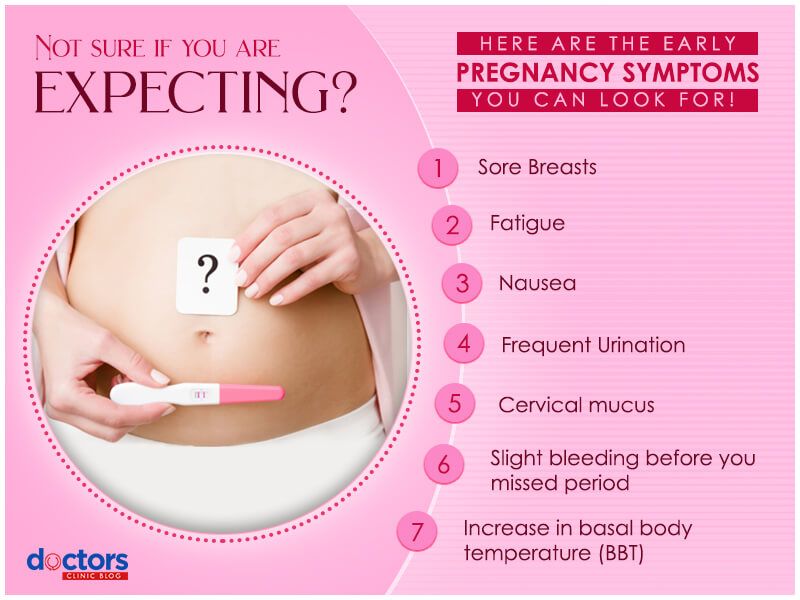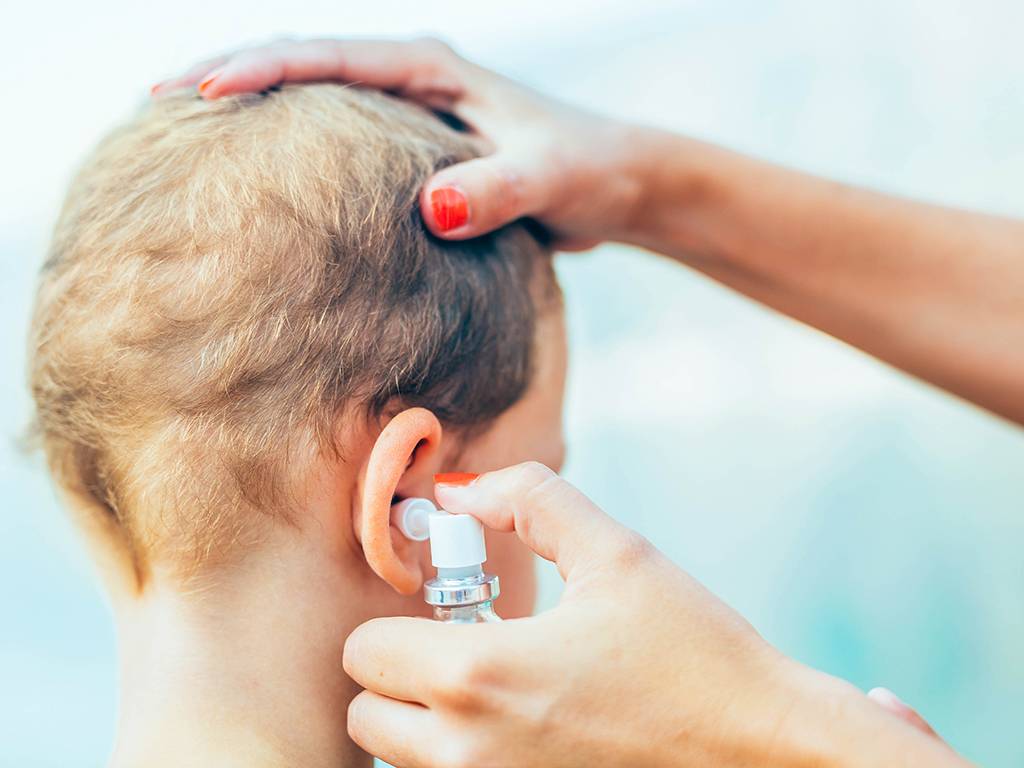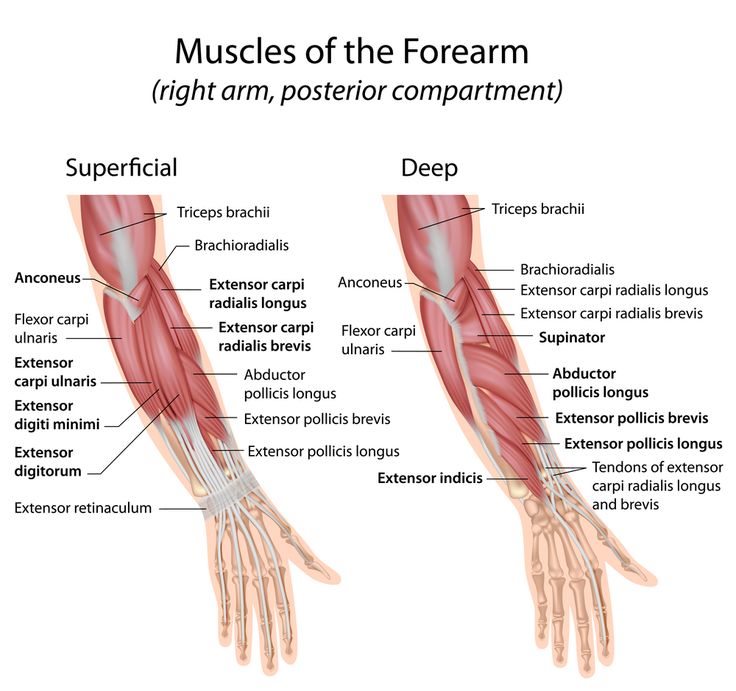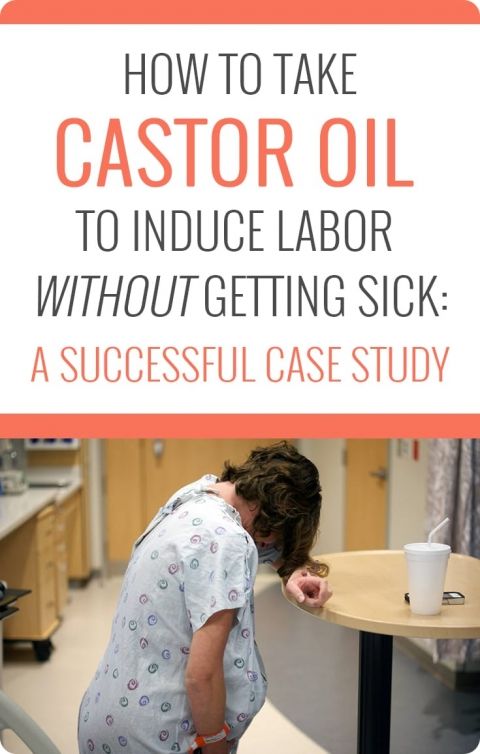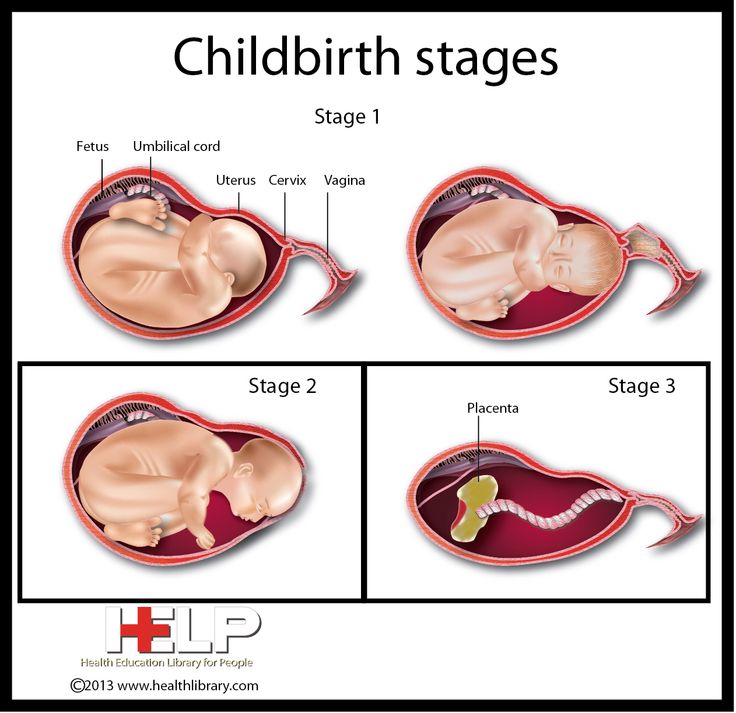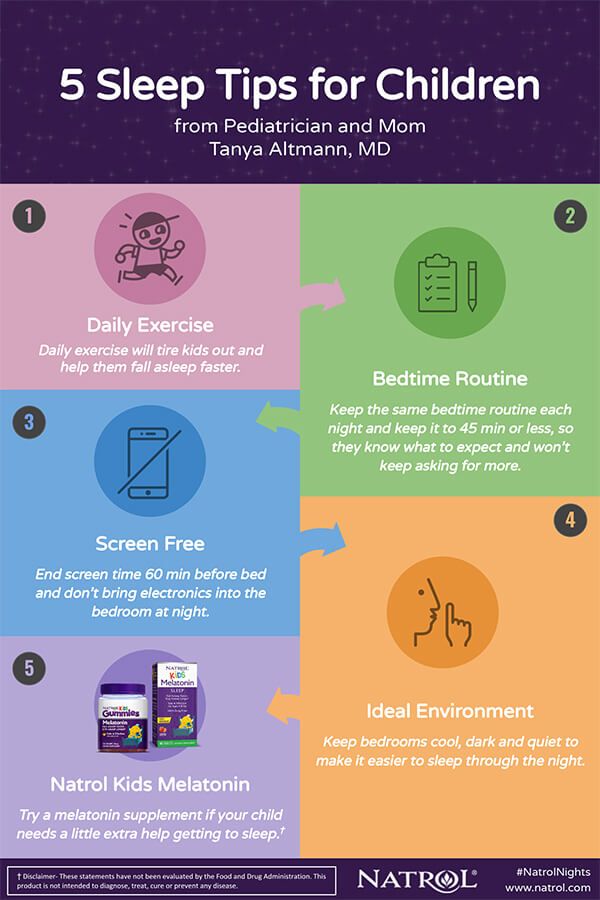Hello 2nd trimester
Hello 2nd Trimester – Emilia's Wings
I am well into my 2nd Trimester! It’s crazy to say out loud that I am already 17 weeks pregnant! The time is going so fast… in one week my pregnancy will already be halfway over! So excited to be one step closer to meeting this little one and getting to hold him or her in my arms!
14 Week Baby Bump
The last month has been rough! My anxiety has increased. There are a lot of triggers for me right now. I am really paranoid about food. I am constantly worried that I am going to eat something that I don’t know is harmful during pregnancy and that it will hurt the baby or cause me to miscarry. Did you know right now there is a Salmonella outbreak in at least 35 known states and that the CDC has no clue what the source of food is?! I feel like I can’t eat a single item of food without looking it up first to make sure it’s on the “safe list”. Even if it’s on the safe list, that doesn’t mean it couldn’t happen to carry Listeria, Salmonella, or some other dangerous bacteria. Navigating food during pregnancy is exhausting to me! Just tonight, we took our girls to get ice cream at Dairy Queen and the thought of me getting food poisoning from an improperly cleaned soft serve machine crossed my mind. I wish I could just eat some dang ice cream (or any food for that matter) without wondering if I’m going to get sick and pass the food-borne illness onto my baby. My morning sickness is still sticking around. Anytime my nausea kicks in, I have to seriously ask myself “Is this morning sickness or did I eat something I shouldn’t have?”
I’m also really bothered by chemicals and fumes. It sounds so silly when I write it down and reread it… Pregnant women should be bothered by chemical fumes… It’s not recommended for anyone to sit and huff paints and other fumes. My husband has been painting various different items the last week or so. It’s not like he paints inside in common sitting areas, it’s always been outdoors, in our garage, or in our sub-basement. But slowly afterwards, I can start to smell the fumes wafting into the house and I start to freak! The other day I made us all eat outside for lunch where the fumes weren’t as concentrated and then afterwards I made us all leave to go shopping so I wasn’t sitting in a house full of fumes. While my husband understands, he is also the rational one and knows that I get myself worked up over things that are really small or not concerning at all. Majority of the time, he could not smell any paint and I could swear the smell was lingering. My neighbor just recently had the exterior of his house painted. I needed to get the mail from the communal mailbox, which required walking past said neighbor’s house. I made myself cross onto the other side of the street (going out of my way) just to avoid being close to his house and the paint fumes.
But slowly afterwards, I can start to smell the fumes wafting into the house and I start to freak! The other day I made us all eat outside for lunch where the fumes weren’t as concentrated and then afterwards I made us all leave to go shopping so I wasn’t sitting in a house full of fumes. While my husband understands, he is also the rational one and knows that I get myself worked up over things that are really small or not concerning at all. Majority of the time, he could not smell any paint and I could swear the smell was lingering. My neighbor just recently had the exterior of his house painted. I needed to get the mail from the communal mailbox, which required walking past said neighbor’s house. I made myself cross onto the other side of the street (going out of my way) just to avoid being close to his house and the paint fumes.
I think the difference between these being normal concerns and these being blown out of proportion concerns is shown by just how paranoid I get. I obsess over situations like these! I let it worry me till my stomach hurts and I start to feel physically ill. I’ve recently admitted to myself that I am definitely experiencing Post Traumatic Stress Disorder. I went through something very traumatic during pregnancy. How could I be expected to not have a high degree of anxiety when pregnant again? You hear about veterans who have PTSD attacks randomly after their service. I feel like I am a veteran who has just been thrown back into the full on war zone again. It’s not just a one or 2 days randomly here and there where I am experiencing flashbacks. It’s a constant flood of reminders that no pregnancy is a safe guarantee. Pregnancy After Loss is living 9 months of life knowing that your baby could die, just like your other baby did. That’s a terrifying and cruel realization. Makes it nearly impossible to enjoy what is suppose to be a time filled with joy and happiness.
I obsess over situations like these! I let it worry me till my stomach hurts and I start to feel physically ill. I’ve recently admitted to myself that I am definitely experiencing Post Traumatic Stress Disorder. I went through something very traumatic during pregnancy. How could I be expected to not have a high degree of anxiety when pregnant again? You hear about veterans who have PTSD attacks randomly after their service. I feel like I am a veteran who has just been thrown back into the full on war zone again. It’s not just a one or 2 days randomly here and there where I am experiencing flashbacks. It’s a constant flood of reminders that no pregnancy is a safe guarantee. Pregnancy After Loss is living 9 months of life knowing that your baby could die, just like your other baby did. That’s a terrifying and cruel realization. Makes it nearly impossible to enjoy what is suppose to be a time filled with joy and happiness.
16 Week Baby Bump
My biggest worry is that something will be wrong with this baby. I am worried that we will go in for my growth and anatomy scan and that the doctor will find something that is genetically wrong with our baby. I think a lot of my fears are rooted within the fact that I am always prepared for the worse, to the point where I am waiting and expecting bad things to always happen to me. I have my next ultrasound in 1.5 weeks… it’s the big one! My 19-week growth and anatomy scan. The one where we learn our baby’s gender! I remember with Adelaide and Emilia being so exciting for this ultrasound! It never crossed my mind that the scan would reveal a genetic disorder or anything along those lines. I always looked toward this ultrasound as specifically being the gender reveal ultrasound and in a way I always took it as a given that the baby would be healthy. Before loss, we are all naive and don’t imagine that bad things will happen to us. All I can think of right now is “What will I do if this baby isn’t healthy?” I honestly don’t care what this baby is….
I am worried that we will go in for my growth and anatomy scan and that the doctor will find something that is genetically wrong with our baby. I think a lot of my fears are rooted within the fact that I am always prepared for the worse, to the point where I am waiting and expecting bad things to always happen to me. I have my next ultrasound in 1.5 weeks… it’s the big one! My 19-week growth and anatomy scan. The one where we learn our baby’s gender! I remember with Adelaide and Emilia being so exciting for this ultrasound! It never crossed my mind that the scan would reveal a genetic disorder or anything along those lines. I always looked toward this ultrasound as specifically being the gender reveal ultrasound and in a way I always took it as a given that the baby would be healthy. Before loss, we are all naive and don’t imagine that bad things will happen to us. All I can think of right now is “What will I do if this baby isn’t healthy?” I honestly don’t care what this baby is…. boy or girl…. I just pray that it is healthy! Either way it is loved! I’ve loved it since the moment I found out I was pregnant. But a mother never stops worrying about her babies and the worries clearly start well before our babies are even born.
boy or girl…. I just pray that it is healthy! Either way it is loved! I’ve loved it since the moment I found out I was pregnant. But a mother never stops worrying about her babies and the worries clearly start well before our babies are even born.
This afternoon I had my first 2nd Trimester OB appointment. Everything went perfect! It was really low key and uneventful. Which – for a pregnancy after loss appointment – is a pretty fantastic visit! Baby’s heartbeat was easy to find and rang in at a strong 150 bpm! This was exactly what I needed for my confidence. After three appointments with three really great heartbeat readings, it gave me courage to put trust into this pregnancy. Things are going really well so far and the baby seems to be growing, as made evident by the bump photos! I know I’ll never let my guard down completely, but I needed an appointment like today to reassure me to enjoy these moments. I don’t want to waste away this pregnancy (my very last pregnancy) worrying over things that never warranted a reason to be worried in the first place.
Your Second Trimester of Pregnancy
You made it through the first trimester! For most people, this means you should see an end to the extreme fatigue and morning sickness that made those first weeks tough.
During this next trimester, you’ll probably feel more energetic—take advantage of this by getting in some pregnancy-safe exercise, curating your registry and starting to prep your home for baby (aka nesting). Depending on your body type, you’ll likely see a baby bump appear soon, so now’s the time to build out your maternity clothing wardrobe. Your baby will also be very busy developing, putting on the pounds and starting to move around in there.
Here’s what to expect during your second trimester.
In This Trimester
- Baby’s Development
- Pregnancy Symptoms
- What to Eat
- Sleep
- Sex
- Weight Gain
- Preeclampsia
- Second Trimester Checklist
How long is the second trimester?
The second trimester of pregnancy lasts from week 13 through the end of week 27, or three months pregnant to about six-and-a-half months pregnant.
Baby’s development in the second trimester
Baby’s development is kicking it into high gear now—a lot happens during the second trimester. Baby starts the second trimester around 2.9” and 0.81 ounces, and by 27 weeks, they’re about 14.4” and 1.9 pounds. Go, baby, go!
They’ll begin to be measured in something called fundal height, which is basically the size of your bump, or the distance from your pubic bone to the top of your belly. This measurement is used as a way to make sure baby is growing.
What else is going on in there? By 16 weeks, their umbilical cord is fully developed. By 18 weeks, baby can hear lots of noises happening inside your body—your heartbeat being the loudest—but they probably won’t hear most noises outside your body until the start of the third trimester.
Baby is growing a soft coating of vernix caseosa, or “cheesy varnish” that prevents their skin from getting wrinkly in the amniotic fluid and protects against drying, temperature changes and bacteria in the first week after birth. The vernix sticks to baby’s skin with the help of lanugo, the soft, fine hair that also protects and warms their skin.
The vernix sticks to baby’s skin with the help of lanugo, the soft, fine hair that also protects and warms their skin.
Baby is drinking amniotic fluid to practice for breast milk or formula once outside the womb, which means they’re also peeing and developing meconium (baby’s first poops). Most babies pass meconium within 48 hours after birth, though some do it in utero and develop meconium aspiration syndrome. These poops look gross and are sticky, but they don’t smell and are usually gone with the first day or two, replaced by other gross poops that come with breastfeeding or formula feeding.
By the end of the second trimester, baby will have developed regular sleep patterns, which usually means they’re lulled to sleep during the day by your regular movements and up and ready to party when you’re turning in for the night. Also, hiccups, which you’ll feel. So cute!
If you want to find out your baby’s sex, and you haven’t found out already via IVF sex selection or noninvasive prenatal testing, you’ll be able to at your 20 week ultrasound with about 80-90% accuracy (assuming baby cooperates!).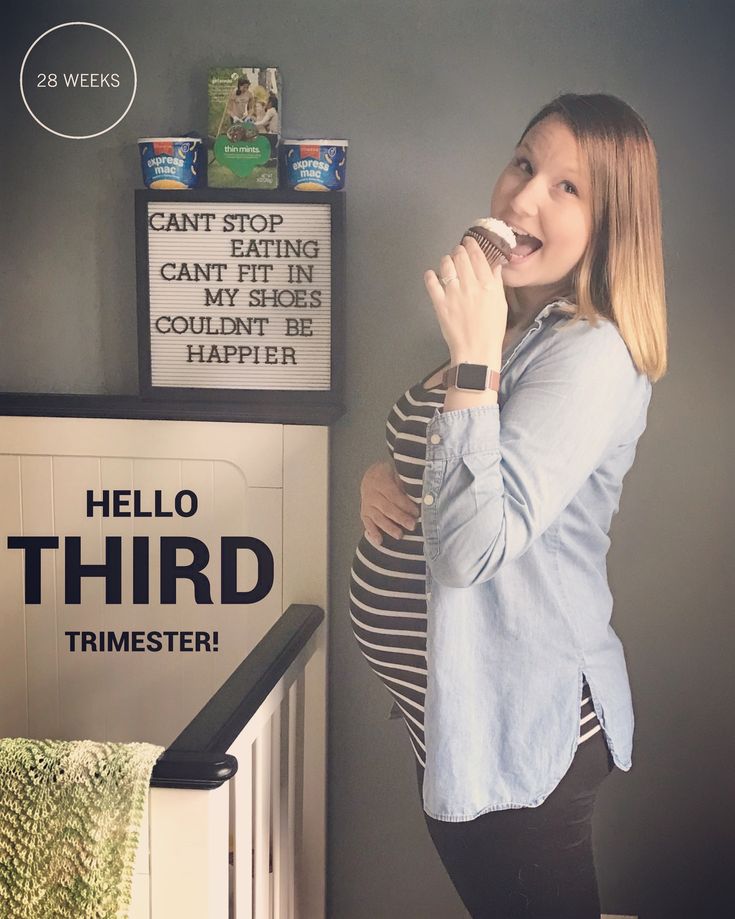
To-Do: Create Your Babylist
With Babylist, you can add any item from any store onto ONE registry. You’ll even get a Hello Baby Box full of free (amazing!) goodies.
Second trimester pregnancy symptoms
Heartburn during pregnancy
The good news is that the nausea of your first trimester has probably passed. The bad news? More than half of pregnant people experience heartburn some time between the second and third trimesters.
Heartburn during pregnancy can happen for a couple of reasons: hormones and lack of space. “Rapidly changing hormones can contribute to increased laxity of the esophageal sphincter, which essentially acts as a barrier between the esophagus and the stomach,” Dr. Rachel Low tells Babylist. “However, when the sphincter relaxes, stomach acid can creep up into the esophagus, causing heartburn.”
You may get a brief break from heartburn for a few weeks in the second trimester as your body’s production of relaxin settles down, but don’t be surprised if it comes back toward the end of this trimester as baby gets bigger. “This is due to the physical changes that are going on as the uterus enlarges and the other organs within the abdomen begin to shift upward, creating pressure,” Dr. Low says.
“This is due to the physical changes that are going on as the uterus enlarges and the other organs within the abdomen begin to shift upward, creating pressure,” Dr. Low says.
If you’re suffering, here are some ways to relieve the discomfort:
- Watch what you eat. Avoid foods high in citric acid (oranges, lemons, limes) as well as fried foods and spicy foods, says Laura Erlich, fertility and obstetric specialist and founder of Mother Nurture Wellness.
- Watch when you eat. Eating smaller meals four to six times a day instead of three big meals can help keep pressure from building up in your esophagus. (You’re already limited on space with a growing baby; don’t limit it more with large meals.) Additionally, wait at least 30 minutes after eating before laying down, Dr. Low says.
- Drink low-fat milk. “Milk is naturally alkaline, meaning it can help decrease the acidity of excess acid and soothe the symptoms of heartburn,” Dr.
 Kelli Burroughs says. And go for low-fat or skim milk, as milk with higher fat content can actually make heartburn worse, she says.
Kelli Burroughs says. And go for low-fat or skim milk, as milk with higher fat content can actually make heartburn worse, she says. - Talk to your doctor. If your heartburn is severe or doesn’t seem to be improving with lifestyle changes, there are prescription meds that could help. Avoid taking an over-the-counter antacid, though, without talking to your healthcare provider first.
Feeling your baby move
Between 18 and 25 weeks pregnant (or earlier if you’ve been pregnant before), you’ll probably begin to feel your baby moving. So exciting! At first it feels like a light fluttering, known as “quickening,” but you’ll soon start feeling kicks, jabs and somersaults from your growing baby. As you get later in your second trimester, others may be able to feel baby moving around in there too just by placing their hand on your belly. At the beginning of your third trimester, you’ll start doing kick counts.
Leg cramps during pregnancy
You may start experiencing leg cramps during your second trimester, particularly when you’re sleeping, thanks to pregnancy weight gain, swelling and changes to your circulation that make it hard for your blood to get from your legs to your heart.
While they are super annoying and can disrupt your sleep, leg cramps aren’t serious. Drink water, stretch throughout the day, massage sore muscles and exercise regularly to help prevent them. Compression socks or stockings can also help get your blood flowing, particularly if you’re flying.
Stretch marks and other pregnancy skin changes
Your skin goes through lots of changes during your pregnancy. As your belly expands during your second trimester, you might notice stretch marks developing on your stomach (they also sometimes show up on your butt, thighs, underarms and breasts). They start out pronounced, ranging from dark brown to pink, depending on your skin color. They will eventually fade, though they’ll never completely go away, Dr. Nateya Carrington, ob-gyn and founder of Radiance Women’s Center, tells Babylist.
Not everyone gets stretch marks, and you can’t really do anything to prevent them from happening. You’ll see a lot of stretch marks creams on the market, but they haven’t been proven to do anything to reduce them or stop them in the first place, Dr.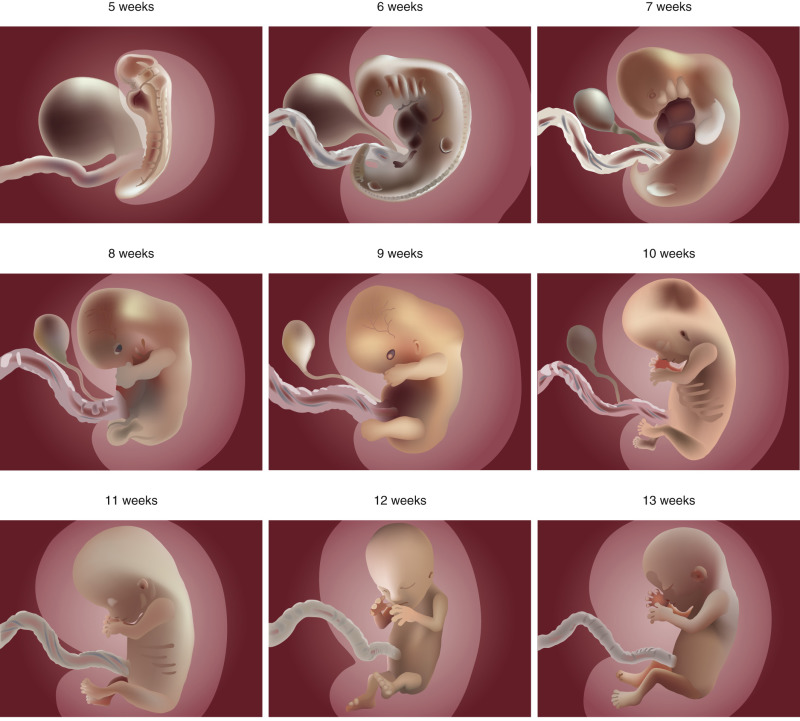 Carrington says.
Carrington says.
Other skin changes caused by pregnancy can be relieved by creams and lotions. Your skin is more sensitive during pregnancy, so use gentle lotions to treat dry, itchy skin. If you notice dark spots appearing on your skin (that aren’t moles), it’s likely melasma, a common pregnancy skin condition caused by an increase in melanin, dermatologist Dr. Lisa Zhang tells Babylist. Consistent use of sunscreen (SPF 30 or higher) every time you’re outdoors can limit melasma from occurring, Dr. Zhang says. If you experience any skin darkening, it will likely go away on its own soon after your baby is born, though it may stick around for a few months.
What to eat—and what to avoid—during pregnancy
Now that your appetite is—hopefully—back, you’ll want to make sure you’re eating healthy and getting the good nutrients you and your baby need. The amount of calories you should aim for depends on your pre-pregnancy weight, how much weight you’ve gained during pregnancy and what trimester you’re in, registered dietitian Lyndsay Hall tells Babylist.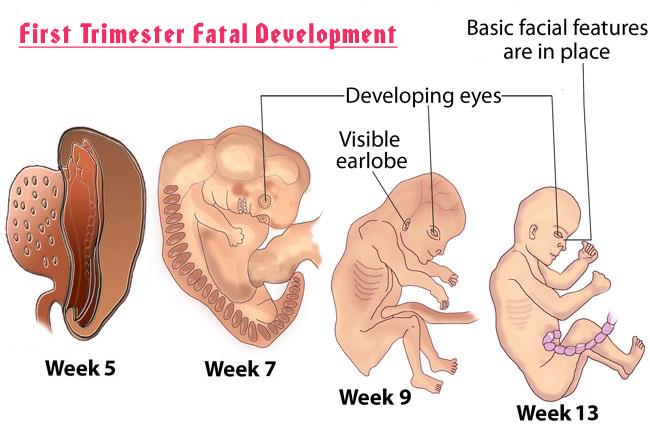 In general, you should only add the caloric equivalent of one additional snack or small meal, Hall says.
In general, you should only add the caloric equivalent of one additional snack or small meal, Hall says.
The best foods to have while pregnant, Hall says, are foods high in:
- Calcium: dairy and dark, leafy greens like kale and spinach)
- Fiber: whole grains, fruits like berries, apples, bananas and oranges and vegetables like carrots, broccoli, artichokes and potatoes
- Protein: meat, eggs, cottage cheese, Greek yogurt, peanuts and peanut butter, pumpkin seeds
- Healthy fats: Avocados, cheese, dark chocolate, eggs, salmon, nuts, olive oil, full-fat dairy (though as we mentioned before: avoid high-fat foods if you have frequent heartburn)
There are also some foods you should avoid during your pregnancy, including:
- Fish containing high levels of mercury, like tuna, shark and other big fish
- Food with a risk of containing the bacteria listeria, like raw, soft cheeses, deli meats and hot dogs
- Alcohol.
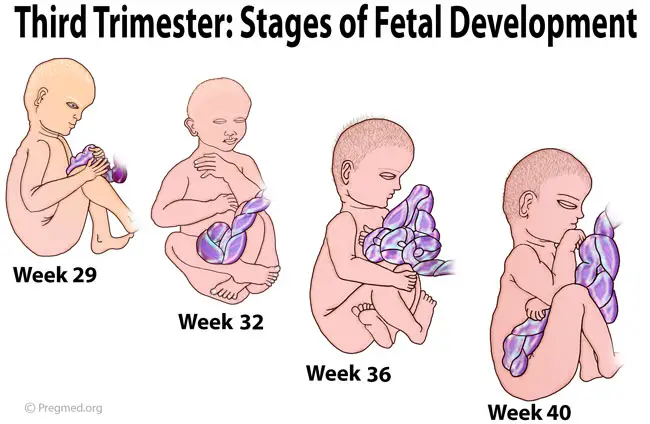 While you may hear some people say that a single glass of wine in late pregnancy isn’t likely to cause any harm, keep in mind that there is no evidence to support that any amount of alcohol is safe at any point in pregnancy, so the safest option is to avoid alcohol entirely.
While you may hear some people say that a single glass of wine in late pregnancy isn’t likely to cause any harm, keep in mind that there is no evidence to support that any amount of alcohol is safe at any point in pregnancy, so the safest option is to avoid alcohol entirely.
Sleep during your second trimester
The exhaustion of your first trimester should be gone, but as you move toward the latter part of your second trimester, you’ll find yourself faced with new sleep challenges.
As your belly grows and your body changes, you may find it harder to get comfortable at night. Pregnancy pillows will be your friend. Consider shopping for one now.
If you’re a back or stomach sleeper, this is a good time to start sleeping on your side, particularly your left, as it’s the best position for blood flow to the uterus. Of course, you can’t stay in one position all night, so if you wake up on your back, don’t freak out; just roll over and try to go back to sleep.
Sex during pregnancy
You may find yourself wanting sex more often during your second trimester—your morning sickness is gone, and all that estrogen may be kicking your libido into high gear, Dr. Mary Jane Minkin tells Babylist. On the other hand, if you’re just not feeling it, it could be due to increased progesterone, Minkin says, or any of the more annoying or painful symptoms of pregnancy. Be open and honest with your partner, and find other forms of intimacy to foster your connection.
If you are comfortable having sex, don’t worry about hurting the baby—they’re nice and cushioned in all that amniotic fluid—and experiment with positions that are comfortable for your changing body. Also, as long as your doctor says it’s okay and you don’t have certain pregnancy complications, you can keep doing it until you go into labor.
Weight gain in the second trimester
Most people have gained about eight to 10 pounds week 20, and will start gaining about one pound per week going forward. By the end of the second trimester, most will have gained 12-17 pounds, though you may gain less if you had a high BMI pre-pregnancy, or you may gain more if you had a low BMI pre-pregnancy.
By the end of the second trimester, most will have gained 12-17 pounds, though you may gain less if you had a high BMI pre-pregnancy, or you may gain more if you had a low BMI pre-pregnancy.
About one-quarter of your weight gain is coming from extra fluids (here’s what makes up the rest), so swelling during pregnancy is completely normal, especially in your ankles and feet. If it gets uncomfortable, try staying off your feet, drinking lots of water and reducing your caffeine and sodium intake to manage it. If you have sudden, extreme swelling in your hands and feet, contact your doctor. It may be a sign of preeclampsia.
What is preeclampsia?
Some pregnancy complications can be scary. Preeclampsia is one of them. A condition that involves high blood pressure and damage to the kidneys or liver, it affects between two and five percent of pregnancies. It usually begins after 20 weeks of pregnancy.
What are preeclamsia symptoms?
- Blood pressure above 140/90 on two occasions and blood pressure above 160/110 at least once
- Upper abdominal pain
- Protein in the urine
- Swelling in the face or hands (not everyone experiences swelling)
- Vision changes, like blurry vision or seeing spots
- Headaches that don’t go away
- Vomiting (in the second half of pregnancy)
If you notice any of these symptoms, call your doctor as soon as possible. Know that preeclampsia is treatable, so getting the right care early enough is very, very important for you and baby.
Know that preeclampsia is treatable, so getting the right care early enough is very, very important for you and baby.
Second Trimester Pregnancy Checklist
- Schedule your 20 week ultrasound (and decide if you want to find out your baby’s sex).
- Make your pregnancy announcement to friends and family.
- Start your baby registry.
- Make your list of baby names.
- Schedule a dental cleaning. Pregnancy increases the risk of gum disease, so take extra care of those teeth right now.
- Baby shower time is quickly approaching. First steps: figure out who is going to host and where, set a budget and pick a date.
- Enroll in a childbirth or baby care class through your hospital, birthing center, local parenting center or online.
- Make your gestational diabetes lab appointment for 24–28 weeks (remember you have to wait 1-3 hours at the lab).
- See if your health insurance will provide a free breast pump.
- Decide if you’re going to hire a doula.

- If you’re thinking of taking a babymoon, research locations and start booking your travel.
- Make time for yourself. Schedule a prenatal massage, mani/pedi or whatever makes you happy.
Sources:
- Mayo Clinic: What’s the significance of a fundal height measurement?
- American Academy of Pediatrics: When can my unborn baby hear me? I’d love to be able to read and sing to them
- Indian Journal of Dermatology: Unraveling the Mystery of Vernix Caseosa
- Cleveland Clinic: Lanugo
- WebMD: What Is Meconium?
- Healthline: How Soon Can You Find Out the Sex of Your Baby?
- Dr. Rachel Low, ND
- Laura Erlich, founder of Mother Nurture Wellness
- Dr. Kelli Burroughs, MD, ob-gyn
- Cleveland Clinic: Quickening in Pregnancy
- Mayo Clinic: What causes leg cramps during pregnancy, and can they be prevented?
- Dr. Nateya Carrington, ob-gyn and founder of Radiance Women’s Center
- Dr.
 Lisa Zhang, dermatologist
Lisa Zhang, dermatologist - Lyndsay Hall: registered dietician
- American Pregnancy Association: Listeria During Pregnancy
- Centers for Disease Control and Prevention: Alcohol Use During Pregnancy
- American Pregnancy Association: Best Sleeping Positions During Pregnancy
- Dr. Mary Jane Minkin, ob-gyn and founder of MadameOvary.com
- Mayo Clinic: Pregnancy weight gain: What’s healthy?
This information is provided for educational and entertainment purposes only. We do not accept any responsibility for any liability, loss or risk, personal or otherwise, incurred as a consequence, directly or indirectly, from any information or advice contained here. Babylist may earn compensation from affiliate links in this content. Learn more about how we write Babylist content and the Babylist Health Advisory Board.
Migraine during pregnancy: what to do
Migraine is a benign disease, it does not affect the course of pregnancy and fetal development. However, migraine and pregnancy is a combination that requires a responsible attitude. Especially with frequent migraines (more than 2 times a week) and migraines with aura, because:
However, migraine and pregnancy is a combination that requires a responsible attitude. Especially with frequent migraines (more than 2 times a week) and migraines with aura, because:
-
medicines approved for use, few,
-
and the approach to the treatment and prevention of migraine during this period is extremely individual: it depends on the frequency, severity and duration of headache, the degree of impact on life. nine0003
Our neurologist Daria Korobkova conducted a live broadcast on the clinic's Instagram account, where she told how migraine and pregnancy are connected, why attacks become more frequent or disappear, and answered subscribers' questions. The ether was saved, see “Air recording: migraine during pregnancy and GV.
We will tell about migraine during breastfeeding separately.
The statistics of clinical observations of migraine during pregnancy looks like this:
In 60-70% of pregnant women with migraine, headache attacks become less frequent, milder, or even completely disappear in the second and third trimesters. This is due to the stabilization of estrogen levels. By the beginning of the second trimester, it rises 6 times and its fluctuations stop. nine0003
This is due to the stabilization of estrogen levels. By the beginning of the second trimester, it rises 6 times and its fluctuations stop. nine0003
In other women, migraines during pregnancy either remain unchanged or worsen. But as the duration of pregnancy increases, the proportion of such women gradually decreases:
If at the end of the first trimester the frequency and intensity of attacks persist, then it is most likely that migraine will disturb the woman throughout the entire period of pregnancy and after childbirth too.
How to manage migraine during pregnancy?
The main thing here is to learn how to control seizures and, if necessary, seek medical help. nine0003
-
Follow lifestyle advice:
-
get enough sleep;
-
drink enough fluids;
-
eat fractionally and without long breaks;
-
rest;
-
avoid stressful situations.
 This is one of the main provocateurs of migraine. Psychotherapy, relaxation and stress management are here to help you.
This is one of the main provocateurs of migraine. Psychotherapy, relaxation and stress management are here to help you.
-
Keep a headache diary. This will help you take control of migraine triggers.
Yes, these simple recommendations are sometimes enough to make seizures less frequent! Pregnancy is a special state of a woman. If in other periods of life we do not take such recommendations so seriously, then in this situation it is worth trying to change the philosophy of life and attitude towards ourselves =)
How to relieve an attack?
-
Favor non-drug methods. Sometimes, in order to relieve an attack, it is enough to eliminate an unfavorable factor:
-
dry biscuits, ginger, or applesauce may help with nausea;
-
for dehydration - diluted juice or other liquid;
-
sleep, walking or breathing exercises can also help to cope;
-
If the attacks are severe, interfere with your life, then under the supervision of a specialist, you can resort to drug therapy.
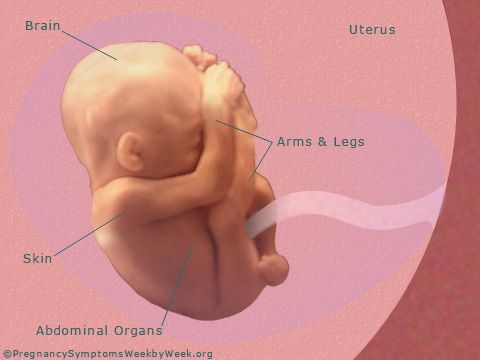 nine0003
nine0003
PARACETAMOL is considered the safest and can be taken throughout pregnancy.
All other drugs have nuances. For example:
-
ibuprofen can be taken in the second trimester, and in the first trimester it is better to limit, in the third trimester the drug is contraindicated for use;
-
aspirin is prohibited in the 3rd trimester and is undesirable for taking in the first two, as it can cause extremely undesirable consequences; nine0003
-
It is strictly forbidden to use ergotamine and opioid analgesics;
-
triptans are not officially approved for use during pregnancy as no controlled studies have been conducted. However, clinical observations of women around the world who took them on their own showed no adverse effects on the fetus. We discussed this issue in more detail on the air.
!Other than paracetamol, we do not recommend the use of any drug without a doctor's prescription.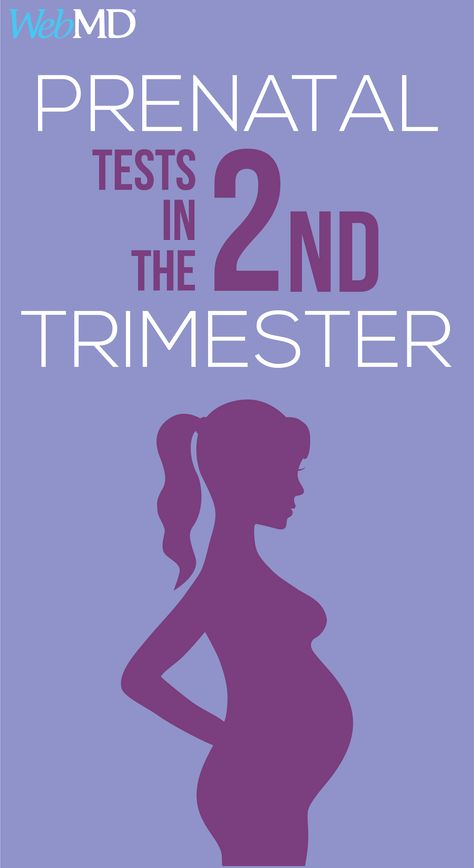 nine0003
nine0003
When to see a doctor:
-
migraine occurred for the first time during pregnancy;
-
if migraine attacks suddenly become more frequent and stronger;
-
if the aura became longer or appeared for the first time;
-
if the headache is rapidly increasing and has an unusual character;
-
if the pressure rises during the headache.
Follow our Instagram to read the latest materials on the diagnosis and treatment of headaches!
cluster headache. Rare but painful Holidays without headaches. Real holidays Something about osteochondrosis. An excerpt from the book of Kirill Skorobogatykh. nine0003
what should be the diet in the second trimester of pregnancy?
Valeria Leshchenko
The second trimester of pregnancy begins at 14 weeks and will last until 27. What will a woman feel and how should she eat?
What will a woman feel and how should she eat?
It is in the second trimester, approximately from the 19th week, that the belly will begin to grow rapidly. It can still be hidden from the eyes of those who ship it, but by the 25th week it will already be noticeable even under a hoodie dress. From about 16-20 weeks, a woman will feel the first movements of the baby, they will not be frequent, but the main thing is that they will. Rarely, but aptly. Now the child still has a lot of space, so nothing constrains his movements. nine0003
Nutrition in the second trimester should be as balanced as possible, as there is a possibility of anemia in a pregnant woman, as well as a lack of calcium and vitamin D. But it is worth remembering that any medicinal prescriptions are made exclusively by an obstetrician-gynecologist, and then only after analysis. A pregnant woman remains to eat right and saturate her body with vitamins as much as possible.
Diet of a pregnant woman in the second trimester of pregnancy:
Fats
A pregnant woman's diet should contain a variety of fats, so you can safely experiment with vegetable oils, adding olive, pumpkin, sea buckthorn, walnut or sesame oil to ready meals. Butter can also be consumed, but it is important that the product is of high quality. But margarine should be excluded. nine0003
Butter can also be consumed, but it is important that the product is of high quality. But margarine should be excluded. nine0003
Porridges
It is good to diversify the diet of a pregnant woman with cereals. The choice is large: oatmeal, pearl barley, corn, buckwheat, brown rice.
Meat
Sausages are delicious, but harmful, and not only for pregnant women. Alternatively, you can cook homemade sausages and bake them in the oven. Preference should be given to organic products: if it is chicken or duck, then homemade. You can also include rabbit, turkey, beef and lean pork in the diet. You can cook meatballs for a couple, bake meat in the oven with spices, and less often - make a grill option. nine0003
Fish
Fish must be chosen carefully as it can cause botulism. That is why you need to buy in supermarkets and specialized sales places, but not in spontaneous markets. It is better to give preference to sea fish, and not grown on a farm. It is also not recommended to eat sushi and river fish.